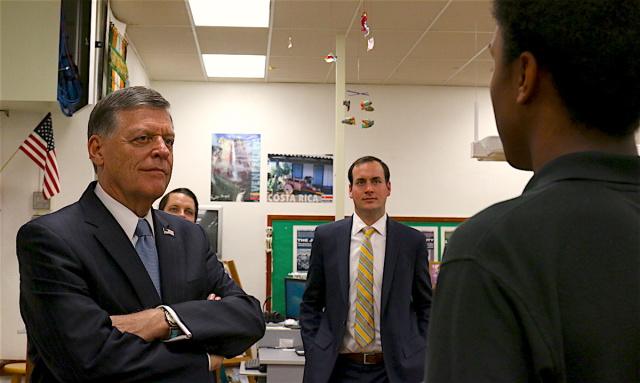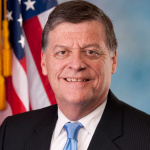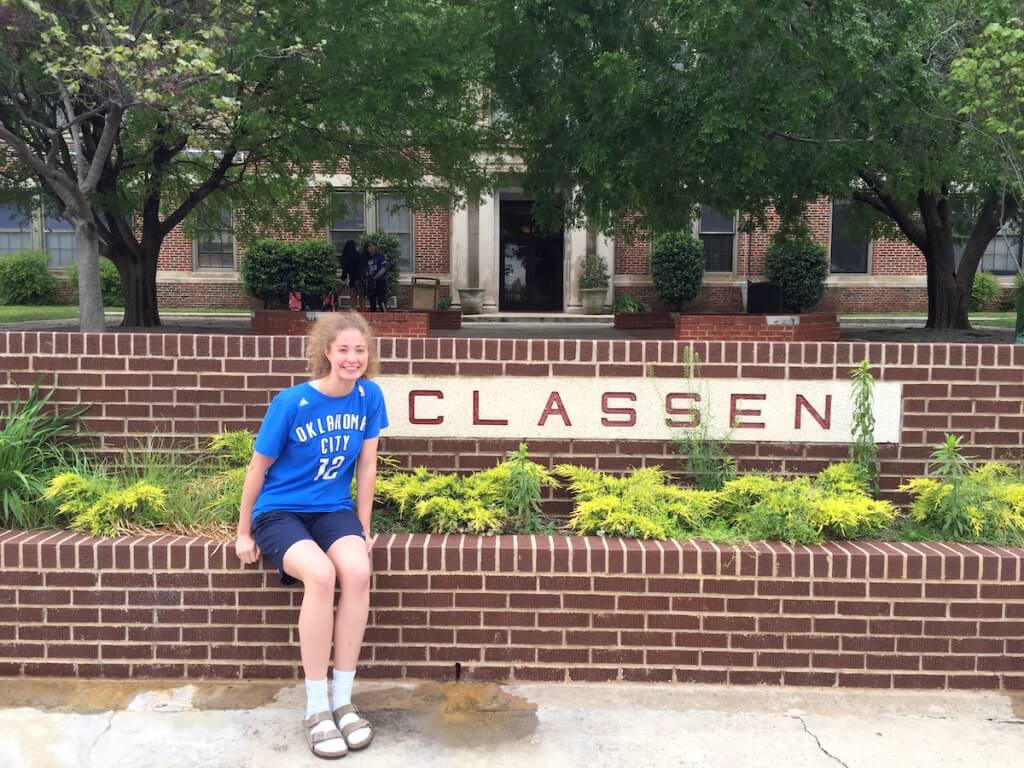
(Editor’s Note: The following story was written by Harding Charter Prep freshman journalism student Dylan DelCol in conjunction with NonDoc editor in chief William W. Savage III. Savage is the school’s baseball coach, and DelCol plays on the team.)
U.S. Rep. Tom Cole (R-Moore) toured Harding Charter Prep High School in OKC on Thursday, learning about advanced placement-focused programs and discussing Oklahoma’s education funding cuts.
“I’m very concerned about it,” Cole said before addressing students in a brief ceremony. “Obviously, it’s created enormous problems and challenges for schools.”
The seven-term congressman’s visit comes after the high school has taken funding cuts to the tune of $40,000 dollars this year, according to principal Mylo Miller.
“What’s the impact been?” Miller said the day before Cole’s visit. “So, whenever I go to hit print, I go over to my printer cartridge, pull it out, and shake it. Yeah, I know it sounds crazy, right? And then I put it back in. And literally I’ve been doing that two months because I don’t want to spend money on a new printer cartridge.”
Funding for public schools in Oklahoma has been cut multiple times over the past few years owing to budget shortfalls and this year’s revenue failure.
The congressman declined to take a position on OU President David Boren’s recently submitted initiative petition for a penny sales tax to fund education. The proposal would yield an estimated $612 million dollars annually for education in Oklahoma and is expected to be on either the primary or general election ballot this year.
“I’m very careful not to get involved in other people’s elections, but I think it’s good people have a choice, that they have an option, and I commend President Boren for presenting that,” Cole said. “That’s what you have elections for. People need to make up their own minds on what they want to do.”
Cole graduated from Moore High School in 1967, but he said the sales tax proposal’s effect on his alma mater would not influence his public opinion.
“It’s not a federal issue, so I make a point of staying out of things (like that),” Cole said. “It is always irritating to me when the state Legislature tells us what we need to do in the Ukraine or on immigration or something where they have no authority, little expertise and they are not part of it.”
Instead, Cole touted some increases in federal funding for public schools through the Title 1 plan, which he oversees.

“One of the things we can do at the federal level is provide some stability and perhaps some increases in the areas of federal funding,” he said.
Cole chairs the House of Representatives Budget Appropriations Committee.
Cole visited Harding in an effort to learn more about the standards of the school recently ranked as Oklahoma’s “most challenging” by the Washington Post. He and the people he visited with said they would like to see higher standards throughout Oklahoma’s entire public education system.
RELATED
High school junior: ‘Oklahoma is failing its students’ by Sophie Trachtenberg
“We’ve got to get back to where all kids can get this education,” said HCP board member Johnny McCharen.
Administrators showcased academic and performing arts programs during Cole’s visit, including orchestra, Advancement Via Individual Determination (AVID), the world language lab and the school’s newly restored gymnasium.
Cole met with the school’s 2015-16 valedictorians and discussed the work that Harding is doing to promote graduates’ success at universities around the country.
“We are a comprehensive school,” Miller said when talking about how Harding was the first school in the state to use AVID.
In schools like Harding — a public charter instead of a private school — the lack of a tuition required to receive a specially tailored education is critical to the future of Oklahoma’s students, Cole said.
“It’s a time of great challenge, obviously, but also a time of tremendous opportunity and experimentation,” the congressman said. “The whole charter school movement is pretty good, but it’s been very controversial in some areas.
“There are some people that don’t approve of charter schools and see them as something that takes away from the broader public effort. I never felt that way at all. I actually see these as places where people who are really committed to education — parents, students, teachers, administrators — have an opportunity to take control of their system (…) in ways that quite often don’t exist in the normal K-12 system.”
(Correction: This story has been updated to correct references to the AVID program and to Harding Charter Prep’s gymnasium.)






















